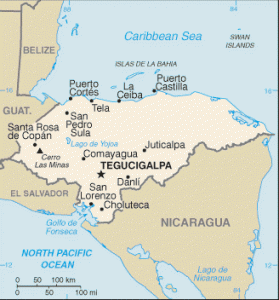America’s drug war in Honduras continues to expand and further militarize the conflict, as Washington’s responsibility for a worsening human rights situation goes unaccounted for.
 The expanded mission, called Operation Anvil, is run with six US State Department attack helicopters and a special team of commando-style Drug Enforcement Administration agents who have now been implicated in the killing of Hondurans on two separate occasions, along with the increasingly aggressive Honduran security forces.
The expanded mission, called Operation Anvil, is run with six US State Department attack helicopters and a special team of commando-style Drug Enforcement Administration agents who have now been implicated in the killing of Hondurans on two separate occasions, along with the increasingly aggressive Honduran security forces.
Just last month, DEA agents cooperated with Honduran security forces in the killing of four civilians, including two pregnant women. In that case, the government kept it from the American people for almost an entire week, and admitted to being involved only after Honduran news media and human rights organizations began publicizing it.
According to the State Department, Operation Anvil is meant to be more effective at intercepting flights and shipments of drugs out of Honduras. After DEA agents shot and killed a suspected drug dealer over the weekend, the US Embassy spokesman Stephen Posivak said it was a “great example of positive U.S.-Honduran cooperation.”
The added State Department and DEA presence is in addition to the more than 600 US troops that are already stationed in Honduras. The DEA is used instead of the military because they have less restrictive rules of engagement.
The Committee of the Families of the Disappeared of Honduras (COFADEH), a human rights organization, said in a statement last month that “a foreign army [i.e., the U.S. army] protected under the new hegemonic concept of the ‘war on drugs,’ legalized with reforms to the 1953 Military Treaty, violates our territorial sovereignty and kills civilians as if it was in Iraq, Afghanistan, Libya or Syria.”
A group of 40 Honduran scholars and former government officials sent a letter to President Barak Obama and Secretary of State Hillary Clinton earlier this month, demanding the US stop supporting the Honduran military and police. The letter was publicly supported by 300 academics in 29 countries.
“It’s really troubling,” said American University anthropology professor Adrienne Pine, one of the signers. “It’s absolutely not appropriate for U.S. law enforcement to be killing other people in other countries.”
Increased US-Honduran cooperation has occurred in tandem with widespread human rights abuses and forced disappearances of political opponents and journalists.
Under the guise of fighting drugs, Washington is imposing itself on countries like Honduras and building a virtual police state. The Obama administration chose to support the illegal military coup in Honduras in 2009, which ousted democratically elected Jose Manuel Zelaya. The coup leaders continued to receive US aid as American military and DEA presence in the country began to expand. This began a descent into what Dana Frank, professor of history at the University of California and an expert on Honduras, called “a human rights and security abyss.”
“We have seen over the years that whenever the military interfaces with the populace, incidents of human rights abuses go way up,” said George Withers, a senior fellow at the Washington Office on Latin America. “We’re concerned that the U.S. is encouraging the use of the military for police work.”


